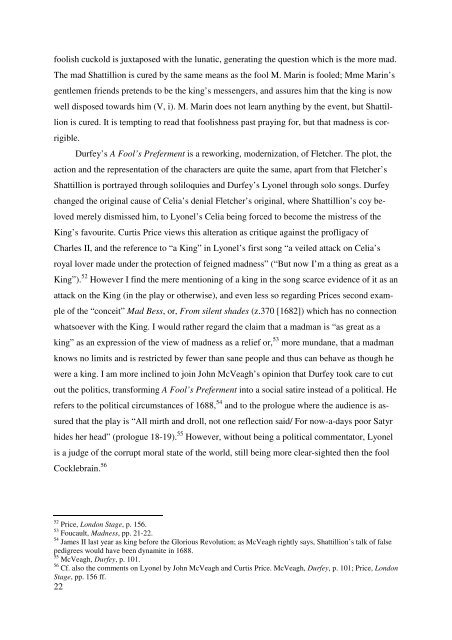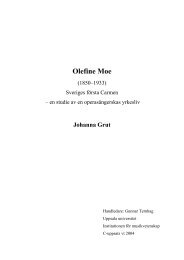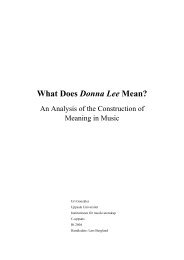Music for the Mad - Institutionen för musikvetenskap - Uppsala ...
Music for the Mad - Institutionen för musikvetenskap - Uppsala ...
Music for the Mad - Institutionen för musikvetenskap - Uppsala ...
Create successful ePaper yourself
Turn your PDF publications into a flip-book with our unique Google optimized e-Paper software.
foolish cuckold is juxtaposed with <strong>the</strong> lunatic, generating <strong>the</strong> question which is <strong>the</strong> more mad.<br />
The mad Shattillion is cured by <strong>the</strong> same means as <strong>the</strong> fool M. Marin is fooled; Mme Marin’s<br />
gentlemen friends pretends to be <strong>the</strong> king’s messengers, and assures him that <strong>the</strong> king is now<br />
well disposed towards him (V, i). M. Marin does not learn anything by <strong>the</strong> event, but Shattil-<br />
lion is cured. It is tempting to read that foolishness past praying <strong>for</strong>, but that madness is cor-<br />
rigible.<br />
22<br />
Durfey’s A Fool’s Preferment is a reworking, modernization, of Fletcher. The plot, <strong>the</strong><br />
action and <strong>the</strong> representation of <strong>the</strong> characters are quite <strong>the</strong> same, apart from that Fletcher’s<br />
Shattillion is portrayed through soliloquies and Durfey’s Lyonel through solo songs. Durfey<br />
changed <strong>the</strong> original cause of Celia’s denial Fletcher’s original, where Shattillion’s coy be-<br />
loved merely dismissed him, to Lyonel’s Celia being <strong>for</strong>ced to become <strong>the</strong> mistress of <strong>the</strong><br />
King’s favourite. Curtis Price views this alteration as critique against <strong>the</strong> profligacy of<br />
Charles II, and <strong>the</strong> reference to “a King” in Lyonel’s first song “a veiled attack on Celia’s<br />
royal lover made under <strong>the</strong> protection of feigned madness” (“But now I’m a thing as great as a<br />
King”). 52 However I find <strong>the</strong> mere mentioning of a king in <strong>the</strong> song scarce evidence of it as an<br />
attack on <strong>the</strong> King (in <strong>the</strong> play or o<strong>the</strong>rwise), and even less so regarding Prices second exam-<br />
ple of <strong>the</strong> “conceit” <strong>Mad</strong> Bess, or, From silent shades (z.370 [1682]) which has no connection<br />
whatsoever with <strong>the</strong> King. I would ra<strong>the</strong>r regard <strong>the</strong> claim that a madman is “as great as a<br />
king” as an expression of <strong>the</strong> view of madness as a relief or, 53 more mundane, that a madman<br />
knows no limits and is restricted by fewer than sane people and thus can behave as though he<br />
were a king. I am more inclined to join John McVeagh’s opinion that Durfey took care to cut<br />
out <strong>the</strong> politics, trans<strong>for</strong>ming A Fool’s Preferment into a social satire instead of a political. He<br />
refers to <strong>the</strong> political circumstances of 1688, 54 and to <strong>the</strong> prologue where <strong>the</strong> audience is as-<br />
sured that <strong>the</strong> play is “All mirth and droll, not one reflection said/ For now-a-days poor Satyr<br />
hides her head” (prologue 18-19). 55 However, without being a political commentator, Lyonel<br />
is a judge of <strong>the</strong> corrupt moral state of <strong>the</strong> world, still being more clear-sighted <strong>the</strong>n <strong>the</strong> fool<br />
Cocklebrain. 56<br />
52<br />
Price, London Stage, p. 156.<br />
53<br />
Foucault, <strong>Mad</strong>ness, pp. 21-22.<br />
54<br />
James II last year as king be<strong>for</strong>e <strong>the</strong> Glorious Revolution; as McVeagh rightly says, Shattillion’s talk of false<br />
pedigrees would have been dynamite in 1688.<br />
55<br />
McVeagh, Durfey, p. 101.<br />
56<br />
Cf. also <strong>the</strong> comments on Lyonel by John McVeagh and Curtis Price. McVeagh, Durfey, p. 101; Price, London<br />
Stage, pp. 156 ff.










